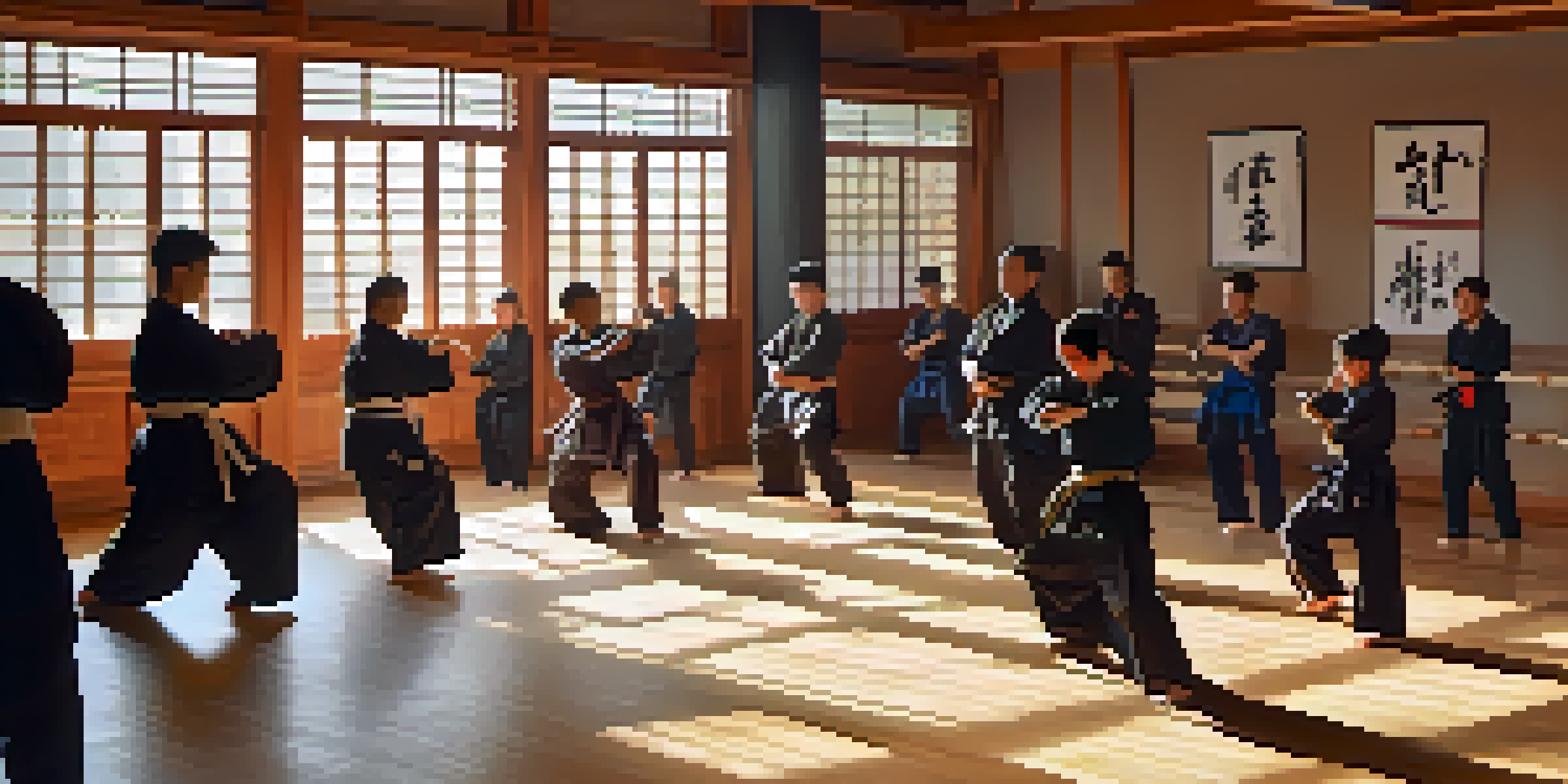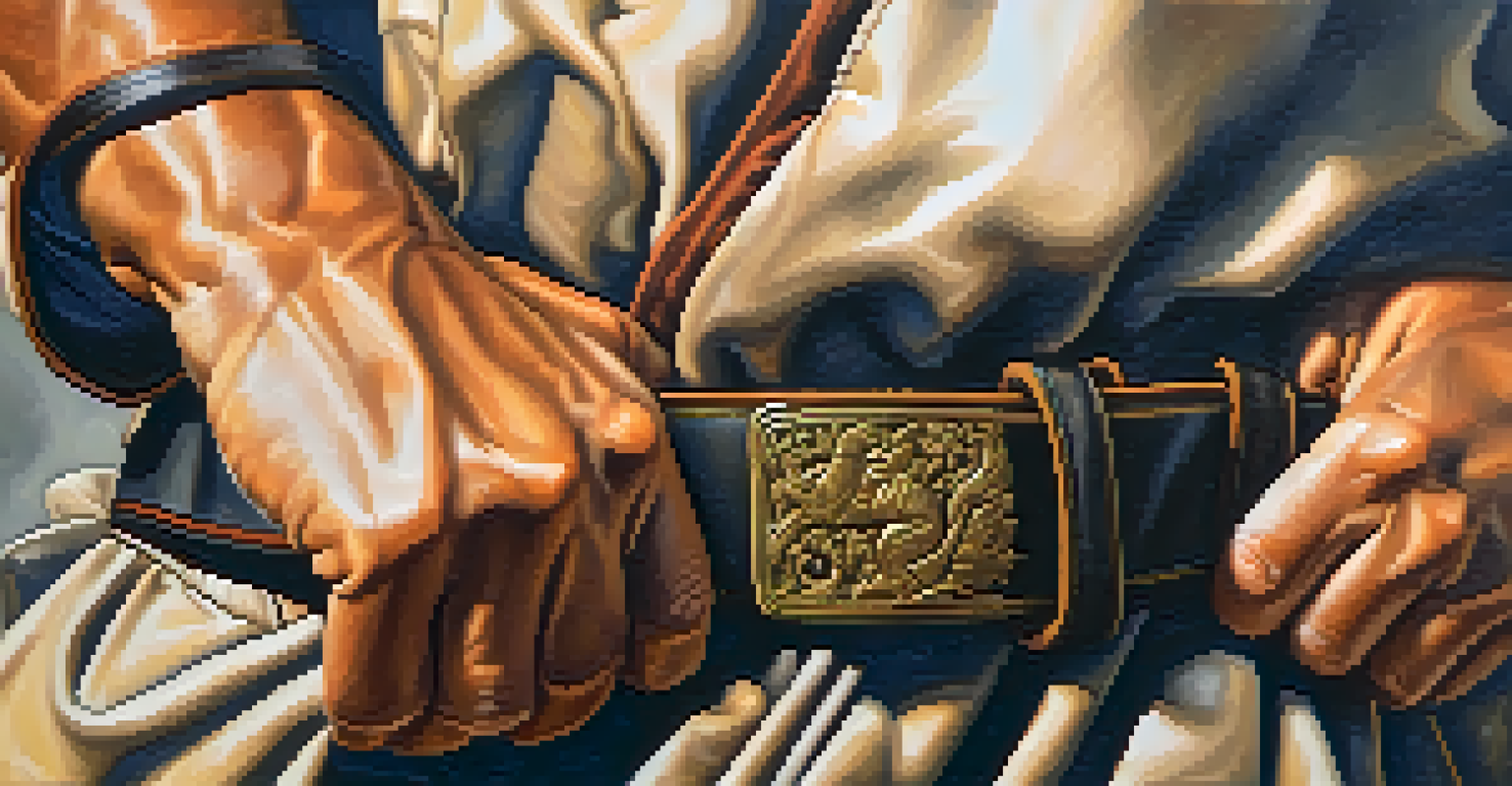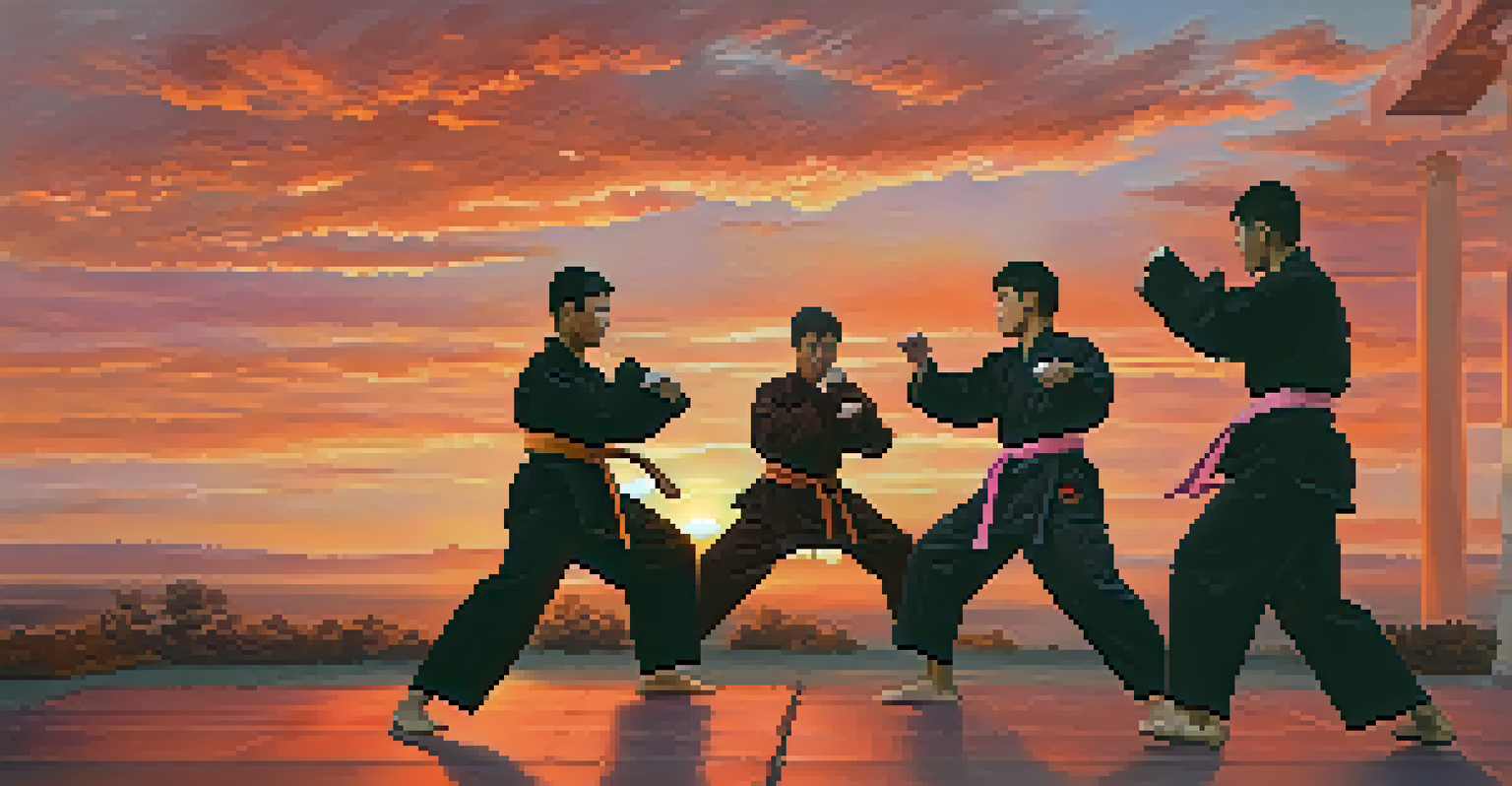Martial Arts as a Pathway to Building Personal Resilience

Understanding Resilience in Today’s World
Resilience is the ability to bounce back from challenges and setbacks. In today’s fast-paced world, where stress and uncertainty seem to lurk around every corner, cultivating resilience is more important than ever. It’s not just about surviving tough times; it’s about thriving despite them. This is where martial arts come into play, offering a unique approach to building this essential trait.
Our greatest glory is not in never falling, but in rising every time we fall.
Martial arts training encourages practitioners to face their fears, whether it’s stepping onto the mat for the first time or tackling a difficult technique. Each class becomes a microcosm of life’s challenges, teaching students to confront adversity head-on. Through consistent practice, individuals learn that perseverance is key, transforming initial struggles into milestones of growth.
Furthermore, the discipline required in martial arts fosters a mindset of resilience. Practitioners quickly realize that success comes from persistence, as they often need to repeat moves countless times before mastering them. This process instills a sense of accomplishment that reinforces their ability to overcome obstacles, both in and out of the dojo.
Building Mental Toughness Through Training
Mental toughness is a crucial aspect of resilience, and martial arts training is a fantastic avenue to develop this quality. The rigorous training sessions push individuals to their limits, both physically and mentally. This not only builds strength but also sharpens the mind, teaching students to remain calm and focused under pressure.

For example, during sparring sessions, martial artists must think on their feet, making quick decisions while remaining composed. This practice translates to real-life scenarios where quick, rational thinking is critical, such as in high-stress work environments. Over time, these skills contribute to an overall increase in confidence and a more resilient outlook on life.
Resilience Through Martial Arts
Martial arts training empowers individuals to build resilience by confronting challenges and fostering a growth mindset.
Moreover, martial arts often emphasizes the importance of setting and achieving goals. Whether it’s earning a new belt or perfecting a technique, each achievement reinforces mental strength. This goal-oriented mindset encourages practitioners to tackle life’s challenges with a proactive attitude, further enhancing their resilience.
The Role of Community in Martial Arts
One of the most enriching aspects of martial arts is the sense of community it fosters. Training alongside others who share similar goals creates a supportive environment where individuals can flourish. This camaraderie not only provides motivation but also encourages practitioners to lean on one another during tough times, reinforcing their resilience.
It's not whether you get knocked down, it's whether you get up.
In martial arts schools, everyone—from beginners to advanced practitioners—learns from each other’s experiences. This shared journey helps build empathy and understanding, reminding us that we’re not alone in our struggles. The bonds formed in these environments can be incredibly powerful, offering emotional support just when it’s needed most.
Additionally, participating in group classes or competitions helps individuals develop teamwork skills. These experiences teach that resilience isn’t just about personal strength; it’s also about knowing when to ask for help and how to support others. This dynamic enhances the overall sense of community and encourages a collective approach to overcoming challenges.
Physical Fitness and Its Impact on Resilience
Engaging in martial arts contributes significantly to physical fitness, which in turn plays a crucial role in building resilience. Regular physical activity has been shown to reduce stress, anxiety, and depression, all of which can hinder our ability to bounce back from adversity. As practitioners become stronger and more agile, they also cultivate a sense of empowerment that affects their mental state.
When individuals feel physically capable, they are more likely to approach challenges with a positive mindset. For instance, a martial artist who has trained rigorously for a competition knows their body can handle the demands of the event. This confidence translates to other aspects of life, making them more willing to take on new challenges or confront difficult situations.
Mental Toughness and Focus
Practicing martial arts enhances mental toughness and focus, equipping students with the skills to handle stress and pressure effectively.
Moreover, the discipline required for martial arts practice ingrains healthy habits. Practitioners learn to prioritize their well-being, which fosters a greater sense of control over their lives. This proactive approach to health and fitness not only boosts resilience but also contributes to long-term mental and emotional stability.
Mindfulness and Focus: Key Elements of Resilience
Martial arts training often incorporates elements of mindfulness and focus, which are essential for building resilience. Practitioners learn to be present in the moment, concentrating on their movements and breathing. This practice helps clear the mind of distractions, allowing them to perform at their best, even in high-pressure situations.
By focusing on the present, martial artists can better manage stress and anxiety. For example, during a sparring match, staying centered can prevent panic and promote strategic thinking. This ability to maintain focus translates to everyday life, enabling individuals to handle stressors with a calm and collected approach.
Additionally, mindfulness practices in martial arts, such as meditation or breathing exercises, can enhance emotional regulation. By learning to observe their thoughts and feelings without judgment, practitioners develop a deeper understanding of themselves. This self-awareness is crucial for resilience, as it allows individuals to navigate their emotions and reactions more effectively.
Overcoming Fear and Embracing Challenges
Fear is a natural response to the unknown, but martial arts training offers a powerful way to confront and overcome it. Stepping onto the mat for the first time can be intimidating, yet it’s also an opportunity for growth. Each time a martial artist faces a fear—whether it’s a new technique or a sparring partner—they develop a greater sense of courage.
For instance, many martial artists recall their initial hesitations about sparring. However, as they confront these fears and gain experience, they often find that their confidence soars. This experience not only builds physical skills but also reinforces the idea that challenges can be tackled head-on, a mindset that extends beyond the dojo.
Community Support in Training
The supportive community in martial arts cultivates empathy and teamwork, reinforcing resilience through shared experiences.
Moreover, embracing challenges in martial arts cultivates a resilience that can withstand life’s uncertainties. When students learn to push through discomfort during training, they become more adept at handling adversity in other areas of life. This shift in perspective empowers them to embrace challenges rather than shy away, fostering a resilient spirit.
The Lifelong Journey of Resilience Through Martial Arts
Martial arts is not just a practice; it’s a lifelong journey toward building resilience. As practitioners progress in their training, they continuously encounter new challenges that require adaptability and growth. This journey reflects the ups and downs of life, equipping individuals with the tools needed to navigate their personal and professional paths.
Moreover, the lessons learned through martial arts extend far beyond the mat. Resilience becomes a part of their identity, influencing how they approach relationships, careers, and personal goals. Each belt earned, each technique mastered, and each challenge overcome adds layers to their resilience, creating a robust foundation for future endeavors.

Ultimately, martial arts teaches that resilience is not a destination but a dynamic process. As individuals evolve, so too does their ability to face life’s trials with strength and grace. This ongoing journey not only enriches their lives but also inspires others to cultivate their own paths of resilience.